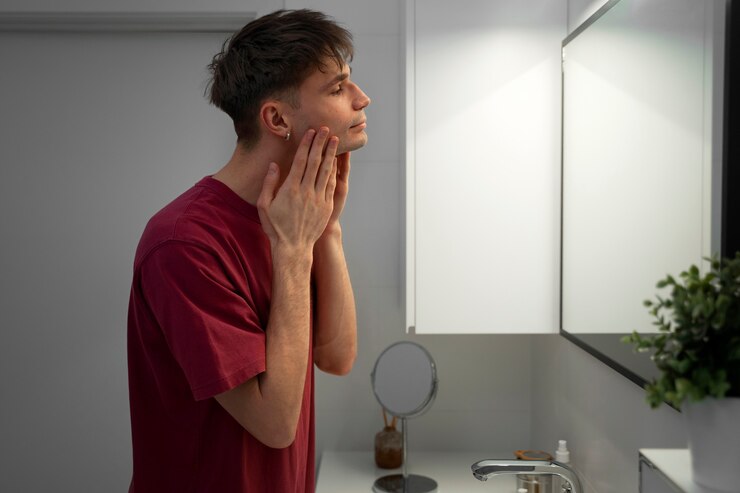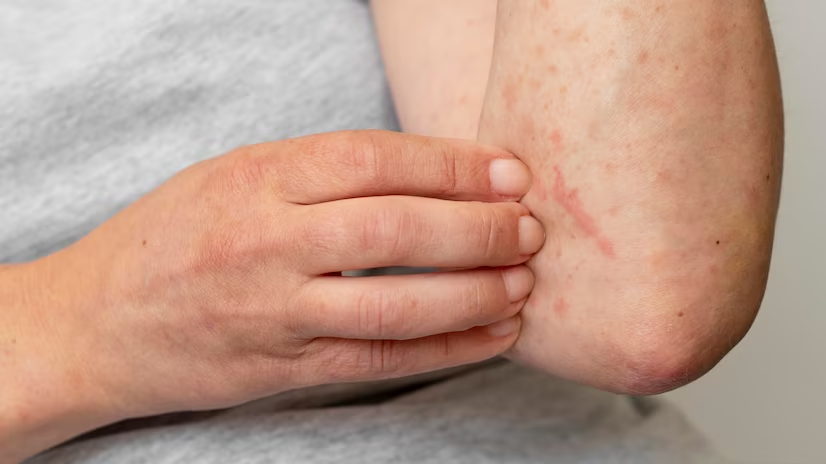
You may wonder, "Why is the skin around my mouth dry?" Dry skin can be annoying and uncomfortable, especially when it affects the delicate area around your mouth. Often triggered by environmental factors, dehydration, or even certain skin conditions, dry skin around the mouth can leave you searching for quick relief.
The good news is that there are several effective methods to help combat this problem, and in this article, we'll explore how to get rid of dry skin around mouth overnight. With these simple steps, you'll be well on your way to saying goodbye to dry skin and hello to a hydrated, healthy-looking smile.
Causes of Dry Skin around the Mouth

Dry skin around the mouth can have several underlying causes. Understanding these causes, you can better address the issue and choose appropriate remedies. Here are some common factors that contribute to dry skin in this area:
Perioral dermatitis
Perioral dermatitis is a common inflammatory disorder that primarily affects the area around the mouth but can also extend to the nose and chin. Perioral dermatitis is characterized by small, red, bumpy papules or pustules, dryness, scaling, and sometimes itching.
One common trigger is the overuse of topical corticosteroids, which can disrupt the skin's natural balance and lead to rebound symptoms when discontinued. Other potential triggers include using certain cosmetic products, such as heavy moisturizers, creams, and fluoridated toothpaste. Hormonal imbalances, such as those occurring during pregnancy or menstrual cycles, may also play a role in some cases.
Eczema
[Eczema](https://www.mayoclinic.org/diseases-conditions/atopic-dermatitis-eczema/symptoms-causes/syc-20353273#:~:text=Atopic%20dermatitis%20(eczema), or atopic dermatitis, is a common skin condition that can contribute to dry skin around the mouth. It is characterized by redness, itching, and inflammation of the skin, which can lead to dry patches and discomfort.
Eczema is a result of a combination of genetic and environmental factors. The exact cause of eczema is not fully understood, but it is believed to involve an overactive immune response and a compromised skin barrier function. When the skin's barrier function is impaired, moisture can escape more easily, leading to dryness.
Allergic contact dermatitis
Allergic contact dermatitis is a type of skin reaction that occurs when the skin comes into contact with an allergen to which an individual is sensitive or allergic. When the skin around the mouth comes into contact with an allergen, it triggers an immune response, resulting in inflammation, redness, itching, and dryness. The skin barrier becomes compromised, allowing moisture to escape and leading to dryness and discomfort.
Irritant contact dermatitis
Irritant contact dermatitis is a common cause of dry skin around the mouth. It occurs when the skin comes into direct contact with irritating substances or chemicals, leading to inflammation, redness, and dryness. Unlike allergic contact dermatitis, which is an immune system response to an allergen, irritant contact dermatitis is a non-allergic reaction that affects anyone exposed to the irritant.
Preparing for Overnight Treatment
If you're wondering, "Why is the skin around my mouth dry?" It's important to take proactive steps to address the issue. Overnight treatment can be particularly beneficial in providing deep hydration and promoting skin repair. Here are some tips on preparing how to get rid of dry skin around mouth overnight:

Cleanse gently
Before starting the overnight treatment, cleanse your face and the area around your mouth with a mild, fragrance-free cleanser. Avoid using hot water, as it can strip the skin of its natural oils, leading to dryness. Gentle cleansing helps remove impurities without further drying out the skin.
Exfoliation (if necessary)
If your dry skin is accompanied by flakiness or roughness, exfoliation can help remove dead skin cells and improve the absorption of moisturizing products. Opt for a gentle exfoliator suitable for sensitive skin and use it sparingly around the mouth area.
Apply a hydrating mask or serum
Incorporate a hydrating mask or serum into your overnight treatment routine to address the dryness. Look for products containing ingredients like hyaluronic acid, aloe vera, or ceramides. These ingredients attract and retain moisture, providing a boost of hydration to the skin.
Lip balm or lip mask
Remember to pay attention to the lips, as they are also prone to dryness. Apply a nourishing lip balm or mask to hydrate and protect the delicate skin. Look for products that contain ingredients like shea butter, cocoa butter, or beeswax to lock in moisture and prevent further dryness.
Overnight Remedies for Dry Skin around the Mouth
If you're dealing with dry skin around your mouth and seeking quick relief, overnight remedies can be particularly helpful. These remedies focus on deeply hydrating and nourishing the skin while you sleep. Here are some effective overnight remedies for dry skin around the mouth:

Honey Mask
Honey is a natural humectant that helps attract and retain moisture in the skin. Before bed, apply a thin layer of raw, organic honey to the dry areas around your mouth. Leave it on overnight and rinse off in the morning. Honey hydrates and has antibacterial properties that can benefit irritated skin.
Overnight Moisturizing Cream
Look for a rich, hydrating moisturizing cream or ointment for dry or sensitive skin. Apply a generous amount to the dry skin around your mouth before bed. These products often contain shea butter, ceramides, or hyaluronic acid, which help replenish moisture and restore the skin barrier overnight.
Petroleum Jelly
Petroleum jelly, such as Vaseline, can be an effective occlusive agent to lock in moisture and protect the skin from further dryness. Before bedtime, apply a thin layer of petroleum jelly to the dry skin around your mouth. This creates a barrier that helps prevent moisture loss and promotes healing.
Coconut Oil
Coconut oil is known for its moisturizing properties. Warm a small amount of organic coconut oil in your hands and gently massage it onto the dry skin around your mouth. Leave it on overnight. Coconut oil not only provides hydration but also contains antibacterial and anti-inflammatory properties.
Overnight Hydrating Mask
Look for overnight hydrating masks specifically formulated to replenish moisture and soothe dry skin. Apply a thick mask layer to the affected area around your mouth before bed. Leave it on overnight and rinse off in the morning. These masks often contain ingredients like hyaluronic acid, ceramides, or aloe vera, which deeply moisturize and nourish the skin.
Humidifier
Dry indoor air can worsen skin dryness. Consider using a humidifier in your bedroom overnight to add moisture to the air. This helps prevent the skin from drying out further and promotes a healthier skin barrier.
Avoid Irritants
Before going to bed, avoid irritants such as harsh facial cleansers, fragranced products, or toothpaste containing drying ingredients. Opt for gentle, fragrance-free products to minimize further irritation.
Additional Tips and Recommendations
In addition to the overnight remedies and explanations, several practical tips and recommendations can help you combat dry skin around the mouth. By incorporating these into your skincare routine and daily habits, you can effectively address the issue and achieve smoother, well-hydrated skin.
Here are some additional tips on how to get rid of dry skin around mouth:
Stay hydrated
Proper hydration is essential for maintaining healthy skin. Drink adequate water throughout the day to keep your body and skin hydrated from within. This can help improve skin moisture levels, including the area around your mouth.
Avoid excessive lip licking
Excessive licking of the lips can contribute to dryness and irritation. Saliva evaporates quickly, leaving the lips and the surrounding skin drier than before. Be mindful of this habit and resist the urge to lick your lips frequently.
Protect your skin from harsh weather conditions
Extreme temperatures, wind, and dry air can worsen dry skin. During cold or windy weather, protect your skin by wearing a scarf or a high-quality lip balm that contains SPF. This helps shield the skin around your mouth from harsh elements.
Manage stress
Stress can exacerbate skin conditions and contribute to dryness—practice stress management techniques like deep breathing, meditation, or engaging in activities that help you relax. Taking care of your mental well-being can indirectly improve your skin health.
When to Seek Medical Advice
Knowing when to seek medical advice for dry skin around the mouth is crucial to ensure proper diagnosis and appropriate treatment. While mild cases of dry skin can often be managed with over-the-counter remedies and self-care, there are instances where medical intervention may be necessary. Here are some indications of when to seek medical advice:
Severe or persistent dryness
If your dry skin around the mouth does not improve despite using home remedies and over-the-counter moisturizers, it may be time to consult a dermatologist. They can evaluate your condition, determine the underlying cause, and recommend a targeted treatment plan.
Discomfort or pain
If your dry skin is accompanied by symptoms such as itching, redness, inflammation, or pain, it's important to seek medical attention. These symptoms could indicate an underlying skin condition requiring professional diagnosis and treatment.
Worsening symptoms
If your dry skin around the mouth worsens or spreads to other areas of the face, it's advisable to consult a healthcare professional. They can assess the situation, rule out any underlying medical conditions, and provide appropriate recommendations.
Pre-existing skin conditions
If you have a pre-existing skin condition, such as eczema or psoriasis, and you notice dryness, specifically around the mouth area, it's important to consult a dermatologist. They can guide in managing the underlying condition and the dryness around the mouth.
If you're unsure whether to seek medical advice, it's always better to err on the side of caution and consult a healthcare professional. They can guide you in determining the best action to address your specific concerns and help you achieve optimal skin health.
Conclusion
Dry skin around the mouth can be a bothersome condition affecting your appearance and comfort. However, you can effectively address and alleviate this issue with the right knowledge and proactive steps. By understanding the causes of dry skin, such as perioral dermatitis, eczema, and allergic or irritant contact dermatitis, you can take targeted measures to address the underlying factors contributing to dryness.









